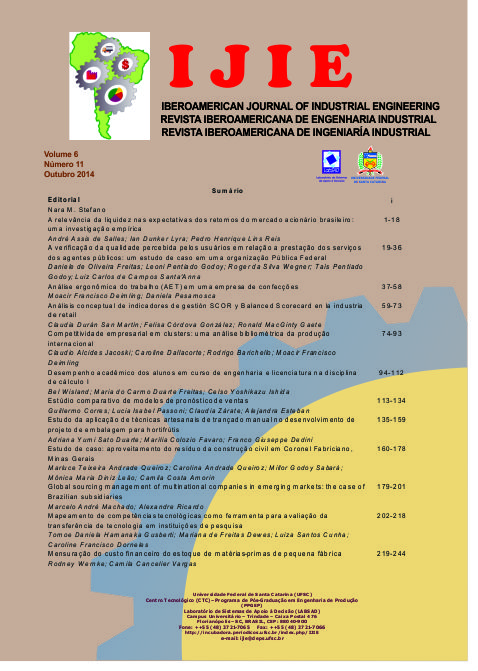Global sourcing management of multinational companies in emerging markets: the case of Brazilian subsidiaries
Palavras-chave:
Production subsidiaries, Supply strategies, Global sourcing, Multinational companies, Emerging marketsResumo
The growing competition for consumer in emerging markets has required from multinational companies (MNC) strategies to support this new business conditions. In this context, the importance of strategies alignment and mutual reinforcement between MNC headquarters and subsidiaries in the supply management are highlighted. The aim of this article was to analyse how foreign multinational company subsidiaries operating in emerging markets like Brazil are embedded and attend MNC global sourcing strategies. A multiple case study research has been conducted in eight Brazilian subsidiaries of MNC through in-depth interviewing with local supply managers and a documentary research was made. It was identified that Brazilian production subsidiary participation is partially aligned with the strategy of MNC global sourcing. The results suggest that subsidiaries in emerging markets should review its approach related to the global sourcing management, becoming more proactive, aligned with the MNC global sourcing strategy, as well as serving in their level of expertise.Referências
Banco Nacional de Desenvolvimento Econômico e Social – BNDES.(2012) Classificação de empresas por porte. Available in: <http://www.bndes.gov.br.
Barney, J. B. (1991) Firm resources and sustained competitive advantage. Journal of Management, v. 17, 99-120.
Barrat, M.; Choi, T.Y.; Li, M. (2011) Qualitative case studies in operations management: Trends, research outcomes, and future research implications. Journal of Operations Management. Vol 29, pp. 329–342.
Bernard, K.N.; Rajagopal, S. (1994) Global procurement: motivations and strategy. Marketing intelligence and Planning, v. 12, p. 4-17.
Edgell, J.; Meister, G.E.; Stamp, N.(2008) Global Sourcing Trends in 2008. Strategic Outsourcing: An International Journal. Vol. 1. p. 173-180.
Eisenhardt, K.M. (1989) Building theories from case study research. Academy of Management Review, v. 14, p. 532-550.
Hartmann E.; Trautmann G.; Jahns C. (2008) Organizational design implications of global sourcing: a multiple case study analysis on application on control mechanisms. Journal of Purchasing and Supply Management, v. 14, p. 28-42.
Hultman, J.; Johnsen, T.; Johnsen, R.; Hertz, S. (2012) An Interaction approach to global sourcing: A case study of IKEA. Journal of Purchasing & Supply Management, v. 18, p. 9-21.
Kotabe, M. (1998) Efficiency versus Effectiveness orientation of global sourcing strategy: a comparison of U.S. and Japanese multinational companies. Academy of Management Executive, v. 12, p. 107-119.
Kotabe, M.; Murray, J.Y. (2004) Global sourcing strategy and sustainable Advantage. Industrial Marketing Management. v. 33, p. 7-14.
Krippel, M.; Antunes, J.A. (2003) Construção da Matriz de Posicionamento Estratégico de Materiais: Um estudo de caso na indústria metal mecânica. In: XXIII ENEGEP – Ouro Preto, MG, Brasil.
LintukangaS, K.; Peltola, S.; Virolainen, V. (2009) Some issues of supply management integration. Journal of Purchasing and Supply Chain Management, v. 15, p. 240-248.
Monczka, R.; Trent, R. (2003a) Understanding Integrated Global Sourcing – A Framework and Case Study. International Journal of Physical Distribution & Logistics Management, v. 23. p. 25-34.
___________________ (2003b) Understanding integrated global sourcing. International Journal of Physical Distribution & Logistics Management, v. 33, p. 607-629.
Nassimbeni, G. (2006) International sourcing: Empirical evidence from a sample of Italian firms. International Journal of Production Economics, v. 103, p. 694-706.
Picchioni, C. N. (2010) Abordagem do global sourcing nas subsidiárias de multinacionais no Brasil. Thesis (Mestrado em Administração). Programa de Pós-Graduação em Administração, Universidade de São Paulo, São Paulo.
Riggs, D.; Robbins, S. (2001) Supply Management Strategies. HSM Management Book – Summary 2.
Serviço Brasileiro de Apoio às Micro e Pequenas Empresas – SEBRAE (2012) Classificação de empresas por número de funcionários. Available in: http://www.sebrae-sc.com.br.
Steinle, C.; Schiele, H. (2008) Limits to global sourcing? Strategic consequences of dependency on international supplier: Cluster theory, resource-based view and case studies. Journal of Purchasing and Supply Management. Vol. 14 No. 1, pp. 3-14.
Trautmann, G.; Bals, L.; Hartmann, E. (2009) Global sourcing in integrated network structures: The case of hybrid purchasing organizations. Journal of International Management. Vol. 15 No. 2, pp. 194-208.
Whitelock, J.(2002) Theories of internationalization and their impact on market entry. International Marketing Review, v. 19, p. 342-347.
World investment report. (2011) United Nations Publication.
Yin, R.K. (1981) The Case Study Crisis: Some Answers. Administrative Science Quarterly, v. 26, p. 58-65.
Downloads
Publicado
Como Citar
Edição
Seção
Licença
Os artigos publicados são de propriedade do IJIE – Iberoamerican Journal of Industrial Engineering, Revista Iberoamericana de Engenharia Industrial, Revista Iberoamericana de Ingeniería Industrial. Os autores são os responsáveis pelos conteúdos dos artigos. O IJIE não se responsabiliza ou endossa as opiniões emitidas pelos autores dos textos publicados, salientando que as opiniões são de exclusiva responsabilidade dos autores.
O periódico se reserva o direito de introduzir alterações no original, visando a manter a homogeneidade e a qualidade da publicação, respeitando, no entanto, o estilo e as opiniões dos autores. Essas alterações serão editoriais (correções gramaticais e adequações estilísticas) e não substanciais, de forma que não modifiquem o sentido do texto. As provas finais não serão enviadas aos autores, sendo o artigo publicado com os ajustes necessários.
Conforme citado neste site, no item “Caráter do IJIE”, os artigos são de uso gratuito, com atribuições próprias em aplicações educacionais e não-comerciais. Uma nova publicação do mesmo texto, de iniciativa de seu autor ou de terceiros, fica sujeita à expressa menção da precedência de sua publicação neste periódico, citando-se a edição e a data dessa publicação.

